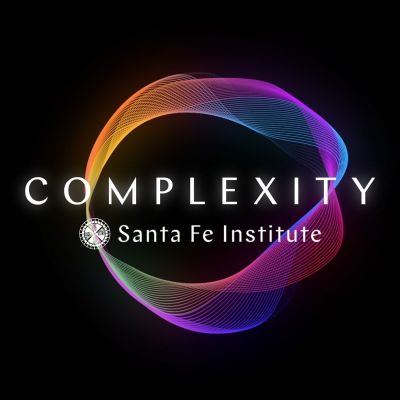Are there universal laws of life and can we find them? Is there a physics of society, of ecology, of evolution? Join us for six episodes of thought-provoking insights on the physics of life and its profound implications on our understanding of the universe. In this season of the Santa Fe Institute’s Complexity podcast’s relaunch, we talk to researchers who have been exploring these questions and more through the lens of complexity science. Subscribe now and be part of the exploration!
https://complexity.simplecast.com
Gesamtlänge aller Episoden: 4 days 12 hours 27 minutes
episode 103: Carlos Gershenson on Balance, Criticality, Antifragility, and The Philosophy of Complex Systems
How do we get a handle on complex systems thinking? What are the implications of this science for philosophy, and where does philosophical tradition foreshadow findings from the scientific frontier?
Welcome to COMPLEXITY, the official podcast of the Santa Fe Institute...
episode 102: Complex Conceptions of Time with David Krakauer, Ted Chiang, David Wolpert, & James Gleick
And now for something completely different! Last October, The Santa Fe Institute held its third InterPlanetary Festival at SITE Santa Fe, celebrating the immensely long time horizon, deep scientific and philosophical questions, psychological challenges, and engineering problems involved in humankind’s Great Work to extend its understanding and presence into outer space...
episode 101: Paul Smaldino & C. Thi Nguyen on Problems with Value Metrics & Governance at Scale (EPE 06)
There are maps, and there are territories, and humans frequently confuse the two. No matter how insistently this point has been made by cognitive neuroscience, epistemology, economics, and a score of other disciplines, one common human error is to act as if we know what we should measure, and that what we measure is what matters. But what we value doesn’t even always have a metric. And even reasonable proxies can distort our understanding of and behavior in the world we want to navigate...
episode 100: Dani Bassett & Perry Zurn on The Neuroscience & Philosophy of Curious Minds
This is a podcast by and for the curious — and yet, in over three years, we have pointed curiosity at nearly every topic but itself...
episode 99: Alison Gopnik on Child Development, Elderhood, Caregiving, and A.I.
Humans have an unusually long childhood — and an unusually long elderhood past the age of reproductive activity...
episode 98: Ricard Solé on Liquid and Solid Brains and Terraforming The Biosphere
What does it mean to think? What are the traits of thinking systems that we could use to identify them? Different environmental variables call for different strategies in individual and collective cognition — what defines the threshold at which so-called “solid” brains transition into “liquids”? And how might we apply these and related lessons from ecology and evolution to help steward a diverse and thriving future with technology, and keep the biosphere afloat?
Welcome to COMPLEXITY,...
episode 97: Glen Weyl & Cris Moore on Plurality, Governance, and Decentralized Society (EPE 05)
In his foundational 1972 paper “More Is Different,” physicist Phil Anderson made the case that reducing the objects of scientific study to their smallest components does not allow researchers to predict the behaviors of those systems upon reconstruction. Another way of putting this is that different disciplines reveal different truths at different scales...
episode 96: John Krakauer Part 2: Learning, Curiosity, and Consciousness
What makes us human? Over the last several decades, the once-vast island of human exceptionalism has lost significant ground to wave upon wave of research revealing cognition, emotion, problem-solving, and tool-use in other organisms. But there remains a clear sense that humans stand apart — evidenced by our unique capacity to overrun the planet and remake it in our image...
episode 95: John Krakauer Part 1: Taking Multiple Perspectives on The Brain
The brain is arguably one of the most complex objects known to science. How best to understand it? That is a trick question: brains are organized at many levels and attempts to grasp them all through one approach — be it micro, macro, anatomical, behavioral — are destined to leave out crucial insights. What more, thinking “vertically” across scales, one might miss important angles from another discipline along the “horizontal” axis...
episode 94: David Wolpert & Farita Tasnim on The Thermodynamics of Communication
Communication is a physical process. It’s common sense that sending and receiving intelligible messages takes work…but how much work? The question of the relationship between energy, information, and matter is one of the deepest known to science...
